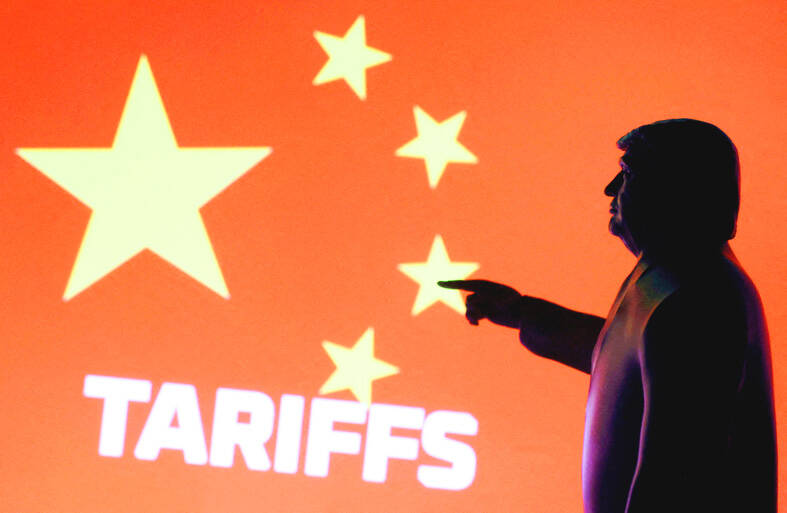China is considering exempting some US imports from its 125 percent tariffs and is asking businesses to identify goods that could be eligible in the biggest sign yet that Beijing is worried about the economic fallout from its trade war with Washington.
A Chinese Ministry of Commerce task force is collecting lists of items that could be exempted from tariffs and is asking companies to submit their own requests, said a source who spoke on the condition of anonymity.
Financial news magazine Caijing yesterday said that Beijing was preparing to include eight semiconductor-related items, but not memory chips.

Photo: Reuters
“The Chinese government, for example, has been asking our companies what sort of things are you importing to China from the US that you cannot find anywhere else and so would shut down your supply chain,” American Chamber of Commerce in China president Michael Hart said yesterday.
Some chamber members say they have imported goods in the past week without the new tariffs being applied, Hart added.
A list of 131 categories of products eligible for exemptions was circulating widely on social media, and among businesses and trade groups yesterday. Reuters could not verify the list, whose items ranged from vaccines and chemicals to jet engines.
While Beijing’s real course of action remains unknown, Huatai Securities Co (華泰證券) analyzed the list circulating in trade groups and said it corresponded to US$45 billion of imports last year.
Repeated telephone calls to China’s customs department were not answered. Customs and the Chinese Ministry of Commerce did not respond to faxed questions.
While Washington has said the current situation is economically untenable and already offered tariff exemptions to some electronic goods, China has repeatedly said it is willing to fight to the end unless the US lifts its tariffs, but beneath the bombast, China’s economy is entering the trade war flirting with deflation. Demand is weak, and consumer spending and sentiment have never properly recovered from COVID-19 pandemic levels.
The Chinese government is pushing tariff-hit exporters to pivot to local markets, but companies said profits are lower, demand weaker and customers less reliable.
Exemptions are a bigger gesture of support, although by allowing some trade to resume, they also reduce the pain for the US economy and take some pressure off the White House.
Many imports, ranging from petrochemical ethane to pharmaceuticals, have few easy alternatives or could take years to manufacture outside the US.
Big pharmaceutical companies including AstraZeneca and GSK have at least one manufacturing site in the US for drugs sold in China, Chinese government data showed.
Major ethane processors have already sought tariff waivers from Beijing, because the US is the only supplier.
Chinese Ministry of Foreign Affairs spokesman Guo Jiakun (郭嘉昆) yesterday said that he was not familiar with the specifics of whether China was planning tariff exemptions on some US imports.
Guo reiterated at a regular news conference that China and the US were not having any consultations or negotiations on tariffs.

Taiwan Semiconductor Manufacturing Co (TSMC, 台積電) last week recorded an increase in the number of shareholders to the highest in almost eight months, despite its share price falling 3.38 percent from the previous week, Taiwan Stock Exchange data released on Saturday showed. As of Friday, TSMC had 1.88 million shareholders, the most since the week of April 25 and an increase of 31,870 from the previous week, the data showed. The number of shareholders jumped despite a drop of NT$50 (US$1.59), or 3.38 percent, in TSMC’s share price from a week earlier to NT$1,430, as investors took profits from their earlier gains

In a high-security Shenzhen laboratory, Chinese scientists have built what Washington has spent years trying to prevent: a prototype of a machine capable of producing the cutting-edge semiconductor chips that power artificial intelligence (AI), smartphones and weapons central to Western military dominance, Reuters has learned. Completed early this year and undergoing testing, the prototype fills nearly an entire factory floor. It was built by a team of former engineers from Dutch semiconductor giant ASML who reverse-engineered the company’s extreme ultraviolet lithography (EUV) machines, according to two people with knowledge of the project. EUV machines sit at the heart of a technological Cold

Taiwan’s long-term economic competitiveness will hinge not only on national champions like Taiwan Semiconductor Manufacturing Co. (TSMC, 台積電) but also on the widespread adoption of artificial intelligence (AI) and other emerging technologies, a US-based scholar has said. At a lecture in Taipei on Tuesday, Jeffrey Ding, assistant professor of political science at the George Washington University and author of "Technology and the Rise of Great Powers," argued that historical experience shows that general-purpose technologies (GPTs) — such as electricity, computers and now AI — shape long-term economic advantages through their diffusion across the broader economy. "What really matters is not who pioneers

TAIWAN VALUE CHAIN: Foxtron is to fully own Luxgen following the transaction and it plans to launch a new electric model, the Foxtron Bria, in Taiwan next year Yulon Motor Co (裕隆汽車) yesterday said that its board of directors approved the disposal of its electric vehicle (EV) unit, Luxgen Motor Co (納智捷汽車), to Foxtron Vehicle Technologies Co (鴻華先進) for NT$787.6 million (US$24.98 million). Foxtron, a half-half joint venture between Yulon affiliate Hua-Chuang Automobile Information Technical Center Co (華創車電) and Hon Hai Precision Industry Co (鴻海精密), expects to wrap up the deal in the first quarter of next year. Foxtron would fully own Luxgen following the transaction, including five car distributing companies, outlets and all employees. The deal is subject to the approval of the Fair Trade Commission, Foxtron said. “Foxtron will be